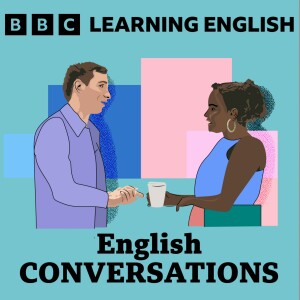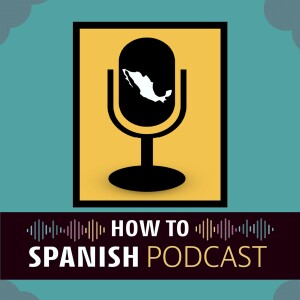

American English With Brent
https://anchor.fm:443/s/11f263ac/podcast/rssEpisode List

Trump and Putin Move Closer to War: 18 Must Know English Terms
In this lesson, you’ll learn 18 powerful English words and phrases from a real news story about President Trump moving U.S. submarines after threats from Russia. Each word comes with a simple and two example sentences—one from the news and one from real life—to help you understand and remember it.✅ I can be your speaking partner https://brentspeak.as.me/ 💙 OVER 100 BONUS ENGLISH LESSONS? Become a channel member. https://www.youtube.com/channel/UCakDTg9dhhAsr3WmHyJDa-g/join1. Nuclear Submarines: Submarines that use nuclear power and can carry nuclear weapons.: President Trump reportedly moved nuclear submarines closer to Russia.: In the movie, a nuclear submarine was hiding deep underwater.2. In Light Of: Because of something; considering something.: In light of Russian threats, Trump made a quick decision.: In light of the bad weather, we stayed home.3. Remarks: Things someone says, often in public or to the media.: Trump made remarks about Russia that got attention.: Her remarks during class were funny and smart.4. Dmitry Medvedev: A well-known Russian leader and former president.: Dmitry Medvedev responded to Trump’s actions with strong words.: We learned about Dmitry Medvedev in world history class.5. Traded Jabs: Said mean or critical things to each other.: Trump and Medvedev traded jabs during their speeches.: The two boys traded jabs on the playground until the teacher stopped them.6. Pentagon: The main office of the U.S. military.: The Pentagon helped decide where to send the submarines.: The news said the Pentagon was planning new safety rules.7. Triggers: Starts or causes something to happen.: Russia’s words triggered a quick reaction from the U.S.: Loud music can trigger my headaches.8. Deployed: Sent people or things to a place to do a job.: The Navy deployed submarines near Europe.: The city deployed more police officers for the big event.9. Engages: Takes part in or begins doing something.: The Navy engages in missions to watch Russian activity.: She engages in sports after school.10. Ballistic Missile: A very fast missile that can travel far and carry explosives.: The U.S. is worried about Russia’s ballistic missiles.: We saw a video of a ballistic missile launching into the sky.11. Tip up: The pointed end or top of something.: U.S. submarines moved toward the tip of the ocean near Europe.: The tip of his pencil broke during the test.12. ICBM: A long-range missile that can travel between continents.: Trump warned about Russia’s ICBMs.: The military explained what ICBMs can do during the news show.13. Hunter Submarine: A submarine that finds and attacks other submarines.: Hunter submarines were sent to look for enemy submarines.: In the video game, I used a hunter submarine to win the battle.14. Vague: Not clear; not giving enough information.: Officials gave vague answers about where the submarines were.: His instructions were vague, so I didn’t know what to do.15. Constantly: Happening all the time or very often.: The Pentagon is constantly watching what Russia is doing.: My little brother constantly asks questions during movies.16. Classified: Secret; not shared with the public.: The location of the submarines was classified.: Some government files are still classified and cannot be seen.17. Disclose: To tell or share information.: The government did not disclose where the submarines were.: She didn’t want to disclose her test score.18. Breakdown : A simple and clear explanation of something.: The reporter gave a breakdown of what Trump decided to do.: The teacher gave us a breakdown of the homework rules.

5 Dead in New York City Shooting (Super Sad Story)
✅ I can be your speaking partner https://brentspeak.as.me/ 💙 OVER 100 BONUS ENGLISH LESSONS? Become a channel member. https://www.youtube.com/channel/UCakDTg9dhhAsr3WmHyJDa-g/join1. Dispatch: Sending help or messages from a control center.: Police dispatch received multiple 911 calls reporting a shooter in the lobby of 345 Park Avenue. : The company dispatch sent a delivery driver to pick up the package.2. Responding: Acting in reply to a call or request.: Responding officers arrived within minutes of the first gunfire reports. : She is responding to emails from her students after school.3. 911: Emergency telephone number in the U.S.: A witness dialed 911 when they saw the shooter with a rifle. : If you smell smoke, call 911 immediately.4. Rushing Into: Moving quickly into a place.: Officers were rushing into the building’s lobby after hearing shots. : Children were rushing into the classroom as class started.5. M4 Assault Rifle: A military-style, semi-automatic rifle.: The shooter used an M4 assault rifle to open fire in the skyscraper’s lobby. : The museum exhibit showed different types of rifles, including an M4 assault rifle.6. Body Armor: Protective clothing worn to stop bullets.: He entered wearing body armor, making the threat more serious. : Some construction workers wear body armor for safety in dangerous zones.7. Spraying: Firing many bullets rapidly.: The suspect sprayed the lobby with bullets before moving to the elevator. : The gardener was spraying water over the plants early in the morning.8. Security Guard: A person who protects buildings or people.: An unarmed security guard was shot while trying to block the shooter’s path. : The mall has a security guard at the entrance checking bags.9. Pillar: A vertical column or support structure.: One victim hid behind a pillar in the lobby before being shot. : The old building had decorative pillars in the hallway.10. Secure: To make a place safe or protected.: Police began to secure the building immediately after the shooting. : They secure the classroom door during exams.11. Opened Fire: Started shooting a gun.: The gunman opened fire in the lobby without warning. : In the video game, the player opened fire on enemy targets.12. Barricading: Blocking a door or area to prevent entry.: Officials say the shooter may have barricaded himself on an upper floor. : She barricaded her room during a thunderstorm for safety.13. Self‑Inflicted: Caused by oneself.: The suspect died from a self‑inflicted gunshot wound. : He accidentally took a self‑inflicted short break while working from home.14. Wound: An injury to skin by a weapon.: One NFL employee suffered a serious wound but is now stable. : After she cut her finger, she cleaned the wound with water.15. CPR: A first-aid technique to revive someone who stops breathing.: Paramedics performed CPR on one injured victim at the scene. (inferred news context): She learned CPR in her health class to help save lives.16. Closet: A small room or enclosed space for storage.Sentence (unrelated): She stored her jacket in the closet before going to class.News: (not applicable directly)17. Escorted: Accompanied someone safely from one place to another.: Survivors were escorted out of the building by police. (logical context): A student was escorted to the nurse’s office after feeling faint.

2,300 People Died From the Heat — Learn These Words Before the Next Disaster Strikes
In June, 2,300 people died across Europe during an extreme heatwave—and the English used to report it can be hard to understand. In this lesson, you’ll learn 24 powerful vocabulary words that are used in real news headlines, English exams like IELTS and TOEFL, and everyday conversations about climate and health. Don’t miss this chance to grow your English and better understand the world around you.✅ I can be your speaking partner https://brentspeak.as.me/ 💙 OVER 100 BONUS ENGLISH LESSONS? Become a channel member. https://www.youtube.com/channel/UCakDTg9dhhAsr3WmHyJDa-g/joinHeat Waves : A long period of very hot weather. : Many people died during the heat wave in June.Notorious : Famous for something bad. : That city is notorious for dangerous heat every summer.Severe : Very serious or dangerous. : The heat was so severe that people had to stay inside.Suffered : Felt pain or harm. : Thousands of people suffered during the extreme heat.Extreme : Very strong or intense. : Extreme heat can be dangerous, especially for older people.Soared : Went up very fast. : Temperatures soared to over 100 degrees.A Study : Research done to learn more about something. : A new study shows that 2,300 people died from the heat.Affected : Changed or hurt by something. : The heat affected millions of people across Europe.Estimates : Guess based on information. : Estimates say over 2,000 people died in the heat.Attributed : Said to be caused by something. : Many deaths were attributed to the extreme temperatures.Climate Change : Long-term changes in weather around the world. : Climate change is making heat waves more common.Fossil Fuels : Oil, gas, or coal used for energy. : Burning fossil fuels adds to climate change.Significantly : In a big or important way. : Temperatures rose significantly during the heat wave.Residential : Related to homes where people live. : Many residential areas had no air conditioning.Estimates : Guesses based on research or data. : Estimates show the heat killed 2,300 people.Vulnerable : Easily hurt or at risk. : Children and older adults are more vulnerable to heat.Elderly : Older adults, usually over 65. : The elderly are often more at risk during heat waves.Complication : Something that makes a health problem worse. : Heat can cause complications for sick people.Chronic : Happens for a long time, not just once. : People with chronic diseases are in more danger from heat.Impair : To hurt or make weaker. : Extreme heat can impair your ability to think clearly.Mechanisms : Systems or ways something works. : Our bodies have mechanisms to keep us cool.Regulate : To control or manage. : Sweating helps regulate our body temperature.Relief : Help or comfort during a hard time. : Fans and cold water can bring relief from heat.Anticipate : To expect or prepare for something. : Doctors anticipate more health problems in the summer.

How to Speak About Age in English: Free English Class
In this lesson, students learn vocabulary to describe different stages of life, from infancy to old age. They explore terms like toddler, teenager, middle-aged, and generation gap, using simple definitions and example sentences. A multiple choice quiz helps students review what they’ve learned and practice using the words correctly.✅ I can be your speaking partner https://brentspeak.as.me/ 💙 OVER 100 BONUS ENGLISH LESSONS? Become a channel member. https://www.youtube.com/channel/UCakDTg9dhhAsr3WmHyJDa-g/join👶 Birth to ChildhoodInfant A baby under one year old. → The infant is sleeping in the crib.Toddler A child between 1 and 3 years old. → The toddler is learning how to walk.Minor: A person under 18 years old (not an adult yet). → He is a minor, so he can’t vote.Adolescent: A person between 12 and 18 years old. → Adolescents often go through many changes in school and life.Teenager: Someone who is 13 to 19 years old. → Teenagers often enjoy hanging out with friends.Peer: Someone who is the same age as you. → Kids often feel pressure from their peers.Young Adult: A person in their late teens or 20s. → As a young adult, she moved out and started college.Mature Acting like an adult; responsible. → She is only 15 but very mature.Immature: Not acting like an adult. → He is 18, but he still acts immature sometimes.Grow up To become older or more mature. → I grew up in a small town.Millennial: A person born between 1981 and 1996. → Many millennials grew up with the internet.Gen Z People born between 1997 and the early 2010s. → Gen Z uses social media every day.Middle-aged Someone who is about 40 to 60 years old. → My dad is middle-aged and still plays soccer.Midlife Crisis: A time around 40–50 when people question their life choices. → During his midlife crisis, he bought a sports car.Over The Hill (idiom): A funny way to say someone is getting old. → He turned 40 and joked that he was over the hill.Senior An older person, usually over 65. → Seniors get discounts at the movie theater.Elderly: A polite way to say someone is very old. → We helped the elderly woman cross the street.Retired: No longer working because of age. → My grandfather is retired and likes to fish.Caretaker: Someone who takes care of a child or elderly person. → My aunt is the caretaker for my grandma.Generation A group of people born around the same time. → My grandparents are from a different generation.Boomer: A nickname for people born after World War II. → My grandma is a boomer and loves Elvis.Age Gap: The difference in age between two people. → There’s a big age gap between me and my brother.Role Model: Someone others look up to or want to be like. → A good teacher can be a strong role model for young people.Generation Gap: The difference in ideas between younger and older people. → There’s a big generation gap between me and my grandpa.

American Dad Forced to Join Russia Army — The English Lesson You Won’t Forget
In this English lesson, you’ll hear the true story of an American dad who moved his family from Texas to Russia—and ended up getting drafted into the Russian military. We’ll learn 21 important English words and phrases that are useful in everyday life. This story is surprising, and the vocabulary will help you sound more natural when speaking English!✅ I can be your speaking partner https://brentspeak.as.me/ 💙 OVER 100 BONUS ENGLISH LESSONS? Become a channel member. https://www.youtube.com/channel/UCakDTg9dhhAsr3WmHyJDa-g/joinStruggling : Having a hard time doing something; facing problems. : Maria is struggling to pay her bills after losing her job.Woke America : A phrase used to describe people or parts of American society that are very aware of social problems, such as racism or unfair treatment. : In “woke America,” many companies try to treat all people fairly and include everyone.Thrown to the Wolves : Left in a bad or dangerous situation without help. : When my manager quit, I was thrown to the wolves and had to run the store alone.Deranged : Acting crazy or not thinking clearly. : That man was yelling in the street like he was completely deranged.Devastated : Extremely sad or upset. : She was devastated when her dog died.Uprooted : Moved suddenly from a place or home. : After the fire, the family was uprooted and had to live in a hotel.Jetted Off : Flew away quickly, especially to another country. : My cousin jetted off to Mexico for her vacation.Husky : A large dog with thick fur, often used in cold places to pull sleds. : They got a husky because they love to go hiking in the snow.Progressive : Supporting change and new ideas. : My boss is very progressive—he lets us work from home whenever we want.Lesbian : A woman who loves or is in a relationship with another woman. : My friend is a lesbian, and she’s getting married next year.Scheme : A secret or clever plan, sometimes dishonest. : The company had a money-saving scheme to cut down on electricity bills.Neoliberal : A way of thinking that supports free markets and less government control. : The new mayor had a neoliberal plan to let private companies fix public roads.Ideologies : Big ideas or beliefs about how life or government should work. : Different countries often fight because their ideologies are not the same.Welder : A person whose job is joining metal pieces together using heat. : My uncle is a welder at the shipyard and builds big metal parts for boats.Drafted : Chosen by the military to become a soldier, often not by choice. : In the past, many young men were drafted during wars.Front Lines : The most dangerous part of a war or battle, where fighting happens. : Nurses were on the front lines during the COVID pandemic.Fully-fledged : Complete or fully developed. : After six months of training, she became a fully-fledged firefighter.Handful : A small number or amount. : Only a handful of people showed up to the meeting.On My Mind : Something I keep thinking about. : My kids are always on my mind when I’m working late.24/7 : All the time, every day and night. : The gas station is open 24/7 in case you need something late at night.Take Care : A way to say goodbye and show care. : “Take care,” she said as she waved goodbye to her friend.
You may also like
Create Your Podcast In Minutes
- Full-featured podcast site
- Unlimited storage and bandwidth
- Comprehensive podcast stats
- Distribute to Apple Podcasts, Spotify, and more
- Make money with your podcast












